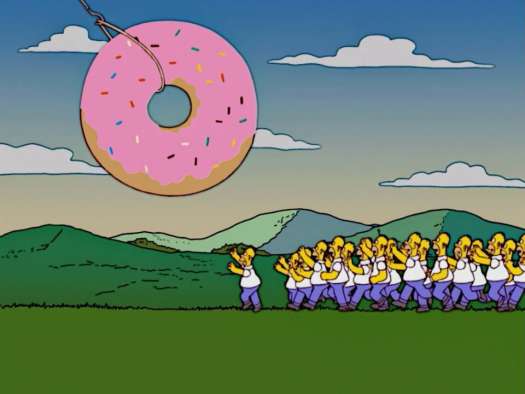It's a seeming disconnect when Patrick Watson states that fourth album, Adventures in Your Backyard, functions as both a "back to basics" record and one designed to blow the band's previous three efforts out of the water. The Montreal singer-songwriter's career thrives on such wholesome incongruities: a tatty exterior with a cultured falsetto, conventional successes via an unconventional sound and a moniker that functions both as birth name and soubriquet for the four-piece chamber-pop quartet.
"We wanted to make an undeniable record. That was our only kind of goal," he says. "Just something really melodic. Something that gives you goose-bumps as soon as you listen to it."
Given that there is ostensibly no definable baseline for the group, Adventures in Your Backyard stretches for artistic minimalism all the same. The musical process for the band ― including guitarist Simon Angell, drummer/marimba player Robbie Kuster, and bassist Mishka Stein ― remains highly collaborative, Watson maintains. While previous efforts were partial to leveraging musical unorthodoxy (by way of bike-wheel percussion or kitchen spoon guitar strumming), Adventures maintains a calmer, earthier sensibility. Compared to past efforts such as the dreamily effervescent Polaris Music Prize winner Close to Paradise or classicist pop quirk of 2009's Wooden Arms, Adventures appears remarkably restrained.
"Within the arrangements, we made a rule that we only put [in] what the song needs. The arrangements were clean, everything just worked. There were very simple rules for this record," Watson says. "It's just really good songwriting, good vocal takes. I think that we've been listening to music all our lives and now when we play music it's not really obvious even to us where the music will really come from," he says. And musically, he adds, the record isn't influenced by anything in particular. "For sure there are influences deep in the music, but it would be difficult for me to tell you which ones for this record. Sometimes we can be a very loud and dynamic band, other times we're soft and subtle. I think that our sound is definitely still there with this new record. It doesn't sound totally different ― I just feel that the musical influences are well sown, all the seams are hidden."
Recorded in Watson's loft apartment in Montreal, the 12-track album eschews overt ambition in favour of an insular, stripped-down atmosphere. Whether it's the cinematic insistence of a track like "Quiet Crowd," the unvarnished acoustics of "Words In the Fire" or the Ennio Morricone-inspired opener "Lighthouse," the album deftly incorporates Watson's gifted tenor with the innovative instrumentation the band is known for.
"I think I love 'Quiet Crowd' just because of the lyrics, which I think are some of the best I've ever written. I love 'Noisy Sunday' just because of the take we did is just... we were just doing a test of the song just to hear back and we ended up with beautiful, raw sound with the right energy. It was so real," he says. The album is supported by folksy series of video shorts featuring Watson weaving in and out in various Quebec settings interacting with locals in their backyards.
The album is representative of what the band has progressively become, he explains. "I was checking out the vinyl pressings the other day, which is something that I don't really do. What I realized is that the vocals are a million times better with this record. I think that we are a very adaptable band. If you take our live shows, there would be 30 dates and there can be 30 totally different shows. We adapt a lot to the rooms that we play in."
It's an intimately grounded aesthetic that informs the overall theme of the project. "Coming home from touring I realized there's a lot of amazing people just around the corner of my house that can give me as much as an adventure as I would have gotten being halfway around the world. When you try to remember your travels, you tend to remember people more than the buildings. These amazing people you met tend to define the places you've been. It's about not taking for granted all of the amazing people right on your horizon and in your own backyard."
From an industry perspective, the band occupies a musical sweet spot that sees its artistic integrity in alignment with commercial considerations. The fact the band's music can be featured on an orange juice commercial and also an American network TV drama while remaining critical darlings is not lost on Watson. The industry as a whole is in an awkward transition, he notes. "It's about less of the evil options. You try to make the best moral decisions and also you don't want to ruin the music for people," he says "It's a tricky time for people that want to pay the rent while making music. You have to try to make the best decisions you can. For me, the most important part is that I'm not thinking about these things when I'm making the music. All that stuff has nothing to do with the pure aspect of making music."
And at this stage in the game, the Watson and band know who and what they want to be. "Music's been my life and I guess I never looked back since then. It became the infrastructure of my life so it's not really a question of whether I want to do music anymore, it's about how I want to do music and how I want to adapt to music. I don't think I've even begun to question why I'm still doing music. For me it's so ingrained into what I do and who I am it's not even a question at this point," he says. "We definitely have a sound. We give people an adventure in their headphones as they walk to work," he says "I don't know what separates us from the rest of the guys but I know what we have to offer."
"We wanted to make an undeniable record. That was our only kind of goal," he says. "Just something really melodic. Something that gives you goose-bumps as soon as you listen to it."
Given that there is ostensibly no definable baseline for the group, Adventures in Your Backyard stretches for artistic minimalism all the same. The musical process for the band ― including guitarist Simon Angell, drummer/marimba player Robbie Kuster, and bassist Mishka Stein ― remains highly collaborative, Watson maintains. While previous efforts were partial to leveraging musical unorthodoxy (by way of bike-wheel percussion or kitchen spoon guitar strumming), Adventures maintains a calmer, earthier sensibility. Compared to past efforts such as the dreamily effervescent Polaris Music Prize winner Close to Paradise or classicist pop quirk of 2009's Wooden Arms, Adventures appears remarkably restrained.
"Within the arrangements, we made a rule that we only put [in] what the song needs. The arrangements were clean, everything just worked. There were very simple rules for this record," Watson says. "It's just really good songwriting, good vocal takes. I think that we've been listening to music all our lives and now when we play music it's not really obvious even to us where the music will really come from," he says. And musically, he adds, the record isn't influenced by anything in particular. "For sure there are influences deep in the music, but it would be difficult for me to tell you which ones for this record. Sometimes we can be a very loud and dynamic band, other times we're soft and subtle. I think that our sound is definitely still there with this new record. It doesn't sound totally different ― I just feel that the musical influences are well sown, all the seams are hidden."
Recorded in Watson's loft apartment in Montreal, the 12-track album eschews overt ambition in favour of an insular, stripped-down atmosphere. Whether it's the cinematic insistence of a track like "Quiet Crowd," the unvarnished acoustics of "Words In the Fire" or the Ennio Morricone-inspired opener "Lighthouse," the album deftly incorporates Watson's gifted tenor with the innovative instrumentation the band is known for.
"I think I love 'Quiet Crowd' just because of the lyrics, which I think are some of the best I've ever written. I love 'Noisy Sunday' just because of the take we did is just... we were just doing a test of the song just to hear back and we ended up with beautiful, raw sound with the right energy. It was so real," he says. The album is supported by folksy series of video shorts featuring Watson weaving in and out in various Quebec settings interacting with locals in their backyards.
The album is representative of what the band has progressively become, he explains. "I was checking out the vinyl pressings the other day, which is something that I don't really do. What I realized is that the vocals are a million times better with this record. I think that we are a very adaptable band. If you take our live shows, there would be 30 dates and there can be 30 totally different shows. We adapt a lot to the rooms that we play in."
It's an intimately grounded aesthetic that informs the overall theme of the project. "Coming home from touring I realized there's a lot of amazing people just around the corner of my house that can give me as much as an adventure as I would have gotten being halfway around the world. When you try to remember your travels, you tend to remember people more than the buildings. These amazing people you met tend to define the places you've been. It's about not taking for granted all of the amazing people right on your horizon and in your own backyard."
From an industry perspective, the band occupies a musical sweet spot that sees its artistic integrity in alignment with commercial considerations. The fact the band's music can be featured on an orange juice commercial and also an American network TV drama while remaining critical darlings is not lost on Watson. The industry as a whole is in an awkward transition, he notes. "It's about less of the evil options. You try to make the best moral decisions and also you don't want to ruin the music for people," he says "It's a tricky time for people that want to pay the rent while making music. You have to try to make the best decisions you can. For me, the most important part is that I'm not thinking about these things when I'm making the music. All that stuff has nothing to do with the pure aspect of making music."
And at this stage in the game, the Watson and band know who and what they want to be. "Music's been my life and I guess I never looked back since then. It became the infrastructure of my life so it's not really a question of whether I want to do music anymore, it's about how I want to do music and how I want to adapt to music. I don't think I've even begun to question why I'm still doing music. For me it's so ingrained into what I do and who I am it's not even a question at this point," he says. "We definitely have a sound. We give people an adventure in their headphones as they walk to work," he says "I don't know what separates us from the rest of the guys but I know what we have to offer."




